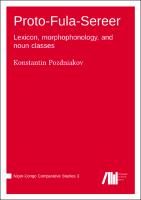Proto-Fula–Sereer
Lexicon, morphophonology, and noun classes
Author(s)
Pozdniakov, Konstantin
Collection
Knowledge Unlatched (KU)Language
EnglishAbstract
This monograph proposes a reconstruction of the lexicon, the morphophonology and the noun class system of Proto-Fula–Sereer (~3500 BP). Fula–Sereer represents one of the six branches of the North-Atlantic group. North-Atlantic, together with the Bak group of languages, forms the Atlantic family, which represents a separate branch within the Niger-Congo macro-family. The lexical reconstruction of the proto-language of a group such as Fula–Sereer requires the solution of a number of questions that are of interest for the general theory of comparative studies. These questions deal with the morphophonological mutations of root-initial consonants. Since consonant mutations were structured into morphological paradigms already at the Proto-Fula–Sereer stage, the evolution of initial consonantism in Fula and Sereer was based not on regular phonetic changes, but on massive irregular analogous changes. The reconstruction of Proto-Fula–Sereer consonant mutations is given in Chapter 2. In Chapters 3-6 the author proposes a reconstruction of the initial consonants. Next, the reconstruction of final consonants (Chapter 7) as well as vowels (Chapter 8) is given. In Chapter 9, taking in account the lexical cognates, the long-standing problem of the PFS noun class reconstruction is rediscussed. The Appendix provides a list of ~720 lexical reconstructions and their approximate meanings.
Keywords
Language Arts & Disciplines; LinguisticsDOI
https://doi.org/10.5281/zenodo.5820515ISBN
9783961103348Publisher
Language Science PressPublisher website
https://langsci-press.org/Publication date and place
2022Grantor
Imprint
Language Science PressClassification
Linguistics


 Download
Download